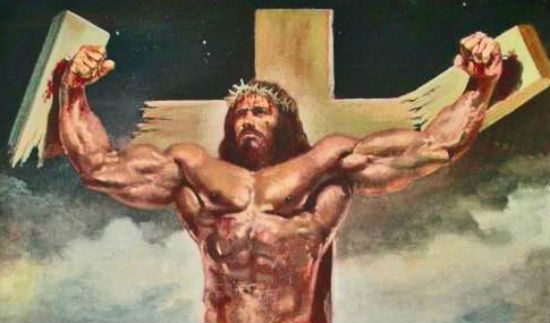It’s still Christmas season, liturgically if not commercially, so let me recommend a nice little Christmas reflection from Paul at the Disoriented/Reoriented blog, discussing the scandalous implications of “The Radical Incarnation.”
Paul’s post focuses on Celsus the Epicurean, a member of the religious right back in the late Second Century who wrote a scathing attack against the new religious movements threatening traditional morality. The tricky and kind of fun aspect of this is that we don’t actually have any surviving copies of Celsus’ tract, which he called his “True Discourses.” All we have are the chunks of it that Origen quotes in his response to it, a defense of Christianity called “Contra Celsus,” written decades later, around 247. So to be fair to Celsus, we can’t be sure how fair to Celsus Origen was being. Paul writes:
To the extent Origen fairly caricatures Celsus’ argument – and to his credit he does seem to quote Celsus at length without apparent modification, though you can’t really be sure about that sort of thing – what jumps out at me, especially in this season, is how much Celsus hated the notion of the incarnation.
The bulk of Celsus’ argument against Christianity could be boiled down to just one sentence: Gods don’t do that.
It was, in Celsus’ view, undignified, inappropriate, and wholly ungodlike for any supposedly divine being to be born as a little infant, a little caganer. A truly divine soul could not possibly trapped in the fragile, finite, bound-by-necessity body of a mortal, a disgusting made-of-meat body that needed to eat and to drink, to sleep and to poop.
Beyond that, this human-bodied creature these Christians followed didn’t behave the way a God ought to. His family fled into Egypt because — unlike a legitimate God — he feared death. Then later in life he just wandered around as an itinerant preacher, relying on handouts from women and keeping company with disreputable ruffians.

Worst of all, Celsus wrote, Jesus died: “Believe that the one whom I am describing to you is the son of God even though he was most dishonorably bound, most shamefully punished, and even though yesterday and the day before he roamed about disgracefully before all eyes.”
And when Jesus died, he just … took it, Celsus says, appalled by such ungodlike behavior, he just accepted arrest, torture, and execution without appropriately “despising” those who subjected him to it, without mocking and jesting at their attempts to kill a God the way any real, true God would have.
Paul quotes plenty more from Celsus-via-Origen and weaves that into a fine reminder that we lose something important when we fail to be as shocked by all of that as this devout Roman writer was. And he makes a fine point about what Celsus saw as the most damning evidence against Jesus — the disgraceful rabble of his followers:
Not only did Jesus earn Celsus’ derision, so did his followers. Because if it was unacceptable for a god to become human, so it was for a religious sect to cavort with the likes of the poor and the female.
Celsus practically snorts as he describes (in Origen’s paraphrase) how Christians “urgently avoid people of taste because they are not ready to be deceived and … entrap countrified individuals.”
Mocking the universality and egalitarianism of the Christian message, Celsus sneers: “Whoever is a sinner, whoever is witless, whoever is a little child, and to say it simply, whoever is ill-starred, the kingdom of God will receive that person.”
Celsus would have made a fine Young Life leader. If this Jesus was worth following, then his followers wouldn’t have been the down and out, they would have been the “up and out.” Celsus was basically Abraham Vereide or Doug Coe.
But Celsus’ argument and critique are most familiar to me from another source. It’s exactly the same critique and refutation of Jesus that we find in the World’s Worst Books. The premise of Left Behind and of all of its sequels — the premise of the entire theological construct of premillennial dispensationalist Rapture Christianity on which those books are based — is exactly the same premise that Celsus argued in his True Discourses: Gods don’t do that.
Left Behind specifically and Rapture Christianity in general is a fantasy based on the idea that Gods ought to behave just exactly the way that Celsus expected them to. They should wield divine power to crush their enemies. They should coerce and compel the entire world to bend to their will. And their followers should be only the best of the best, the elite few worthy of following such a powerful God.
Left Behind wholly agrees with Celsus that everything Jesus did in his First Coming was just wrong — a mistake, and not at all the sort of thing that a God worthy of Godhood ought to have been doing. That is the basis for their desire for a Second Coming, when Jesus will return to correct that mistake, undoing and redoing all of the foolishly ungodlike things he did and said and taught in between Christmas and Easter. Jesus is coming back and this time he’ll get it right. This time he’ll do it the way we would have done it and then you’ll all be sorry but it’ll be too late and you’ll have lost and we’ll have won, neener neener.
When Jesus comes back he won’t be the incarnate Christ that Celsus rightly mocked as a weak and undignified loser. When Jesus comes back, according to the fantasy of the Rapture-Christians, he’ll be a strong, elite winner. Jesus II: Christ Hard With a Vengeance will be the opposite of everything the first Jesus was.
If only there was a word that meant opposite of Christ. That’s who these Rapture Christians are waiting for, and who they serve now.
















